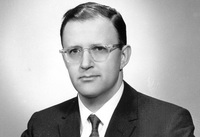Harry V. Jaffa
Born
in New York City, New York, The United States
October 07, 1918
Died
January 10, 2015
Genre
Influences
More books by Harry V. Jaffa…
“Sovereignty...as understood in the Declaration of Independence was originally, and by nature, the equal and unalienable possession of individual human beings. The original equality of all human beings was an equality of sovereignty; no man had more right to rule another than the other had to rule him.”
―
―
“Since there is no a priori knowledge in nature or of nature (no "self-evident" truths) to guide the human will, the human will must itself be the a priori source of all knowledge. Unfettered will is the ground, then, of all morality. That is why National Socialism—which understood itself as "The Triumph of the Will"—is the prototypical modern regime. Long before Hitler, though, it was Marx who wrote: "The philosophers have hitherto only interpreted the world. The point, however, is to change it." Marx meant by this that traditional philosophy—an attempt to interpret or understand the world—was illusory. He believed that genuine knowledge of the world was possible only by changes in the world that originated in one's will. Hence the highest form of intellectual activity—of philosophy—was to be found not in speculation or theory, but in practice or revolution. The supreme revolutionary is the supreme philosopher. The outcome of the most radical revolution is therefore the highest form of wisdom. Hence "the inner truth and greatness" of Hitler's revolution and of Stalin's is one and the same. As such it is beyond skepticism. To doubt becomes treason and is punishable as such, for the aim or purpose of radical modernity—of modern philosophy in its final form—is the elimination of skepticism from human life, the transcendence of the opposition between reason and revelation by the abolition of both.”
―
―
“Radical modernity is the enemy equally of autonomous human reason and of biblical revelation. The core of radical modernity is radical skepticism, a dogmatic skepticism that denies that we do have, or can have, any genuine knowledge of the external world. This dogmatic skepticism denies that either philosophy or revelation in the traditional understanding are possible. It denies that either Socrates or the prophets could ever have distinguished, as Thomas Hobbes put it, whether God had spoken to them in dreams or they had dreamed that God had spoken to them. Hobbes was the precursor of modern scientific positivism, which regards all knowledge as essentially hypothetical and experimental. Its core conviction is that we know only what we make. In constructing a world from hypotheses, we ourselves are the source of all creativity: there is neither need nor room for God. In constructing a world from hypotheses, we have a priori perfect knowledge of that world: there is neither need nor room for philosophy.”
―
―
Topics Mentioning This Author
| topics | posts | views | last activity | |
|---|---|---|---|---|
| The History Book ...: Military Series: BATTLE CRY OF FREEDOM: THE CIVIL WAR ERA - BIBLIOGRAPHY ~ Spoiler Thread | 39 | 126 | Jul 24, 2012 07:48AM | |
| The History Book ...: * #16 (US) ABRAHAM LINCOLN (PRESIDENT) 1861 – 1865 | 310 | 755 | Oct 27, 2025 07:51AM |




































